|
|
|
Sort Order |
|
|
|
Items / Page
|
|
|
|
|
|
|
| Srl | Item |
| 1 |
ID:
100944
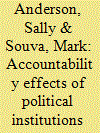

|
|
|
|
|
| Publication |
2010.
|
| Summary/Abstract |
Selectorate theory posits that leader accountability increases with the size of the winning coalition. Recent research contends that capitalism also increases leader accountability because leaders are more dependent on the public for revenue in more capitalist economies. The authors argue that extant tests of accountability arguments of interstate conflict initiation and targeting are flawed. Accountability theories of foreign policy expect leaders to selectively initiate disputes based on their probability of winning. Accountability arguments, then, expect a conditional relationship between the accountability mechanism and the balance of power. For example, if capitalism produces peace through accountability, then more capitalist states should be less likely to initiate militarized disputes as their power advantage decreases. The authors find that this is not the case. At the same time, the authors find robust support for selectorate theory's contention that larger winning coalitions are more selective about using military force. Political institutions induce accountability; capitalism does not.
|
|
|
|
|
|
|
|
|
|
|
|
|
|
|
|
| 2 |
ID:
119961
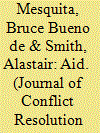

|
|
|
|
|
| Publication |
2013.
|
| Summary/Abstract |
Temporary membership on the United Nations Security Council (UNSC) has pernicious effects on the political and economic development of nations, particularly in nondemocracies. The leaders of rich democratic states often trade resources for the salient policy favors that UNSC members can deliver. This provides the leaders of temporary UNSC members with access to "easy money" resources. Such resources have deleterious consequences, particularly in nondemocracies, because they provide leaders with the means to pay off their coalition of supporters without reliance on tax revenues. While foreign aid is an important form of easy money bribe, it is but one of many. Empirical tests show loans are a substitute means for bribing UNSC members.
|
|
|
|
|
|
|
|
|
|
|
|
|
|
|
|
| 3 |
ID:
079920
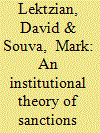

|
|
|
|
|
| Publication |
2007.
|
| Summary/Abstract |
Why do economic sanctions sometimes succeed, but often fail, to produce a policy change? The authors argue that the effect of economic punishment is conditional on a state's political institutions. In all cases, the key to sanctions success is to generate political costs for the target regime's winning coalition. However, because of different institutional incentives, economically punishing sanctions are less likely to succeed against a nondemocratic target than against a democratic target. Sanctions increase rents. This benefits nondemocratic leaders more than democratic ones. Also, nondemocratic leaders have smaller winning coalitions, so their core constituents suffer less from sanctions than democratic leaders. Additionally, the authors' strategic argument leads to novel hypotheses regarding the initiation of sanctions. They test hypotheses from their political cost argument against all dyadic sanctions cases between 1948 and 1990, using two different dependent variables and a censored selection estimator to take into account the strategic nature of sanctioning
|
|
|
|
|
|
|
|
|
|
|
|
|
|
|
|
| 4 |
ID:
152415
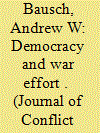

|
|
|
|
|
| Summary/Abstract |
This article uses a laboratory experiment to explore how groups’ internal rules for leader selection affect how leaders select into and fight conflicts. The findings reveal that, counter to expectations, leaders of democratic groups were more likely than leaders of autocratic groups to select into a conflict rather than accept a negotiated settlement. Conditional on conflict occurring, democratic leaders did not mobilize more resources for war than autocratic leaders. However, democratic leaders were less likely to accept a settlement once a war was underway and they expended more effort in the last round of conflict, suggesting once they entered a war they fought for a decisive victory. Domestically, democratic leaders were punished for losing wars more often than autocratic leaders, while winning wars did not benefit democratic leaders significantly.
|
|
|
|
|
|
|
|
|
|
|
|
|
|
|
|
| 5 |
ID:
140077
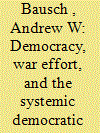

|
|
|
|
|
| Summary/Abstract |
This article uses an agent-based model and Selectorate Theory to explore the micro-foundations of the systemic democratic peace. Leaders engage in an international bargaining game that can escalate to conflict. Upon resolving the dispute, leaders distribute winnings to domestic constituencies and stand for reselection. The model’s assumptions about selectorate size in a democracy versus an autocracy make democratic leaders more accountable than autocrats and endogenously generates the dyadic democratic peace. The model shows no evidence of an autocratic peace, as mixed dyads are less likely to go to war than autocratic dyads. I further show that democratic leaders invest more resources in wars than predicted by the Nash equilibrium and also more than autocrats. This overinvestment by democratic leaders results in democracies winning more wars than autocrats. This model thus reinforces previous findings that democratic leaders respond to domestic reselection incentives by using more resources in conflict to gain a war-fighting advantage and help ensure victory. Finally, consistent with empirical results, I show that increasing the percentage of democracies in the system does not have a linear effect on the amount of conflict in the system. Below a certain threshold, increasing democracy has no effect on conflict, while after this threshold conflict decreases.
|
|
|
|
|
|
|
|
|
|
|
|
|
|
|
|
| 6 |
ID:
192235
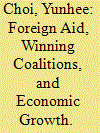

|
|
|
|
|
| Summary/Abstract |
This paper examines the conditional effectiveness of foreign aid for economic growth. Theoretically, I argue that to maximize the chance to stay in office, the leaders of a large winning coalition will spend the aid money as intended, to provide public goods, which aids economic growth. On the other hand, leaders of a small winning coalition will spend the money on private goods, which is less effective for growth. To test this argument, I construct a panel data set for 28 Asian countries (1990–2010) and apply the generalized method of moments. I find that the interaction between ODA and coalition size significantly affects economic growth. Broadly, for large winning coalitions, growth rate increases with higher ODA, while for small winning coalitions it decreases with higher ODA.
|
|
|
|
|
|
|
|
|
|
|
|
|
|
|
|
| 7 |
ID:
143345
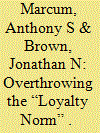

|
|
|
|
|
| Summary/Abstract |
This article examines two competing theories that link variation in the size of a winning coalition to its members’ incentives and ability to orchestrate coups d’état against authoritarian leaders. Selectorate theory’s “loyalty norm” focuses on the incumbent’s ability to buy support and the challenger’s inability to guarantee inclusion in a future coalition. It suggests that, in small-coalition systems, the probability of coup attempts and successes decreases as coalition size decreases. We develop an alternative theory of political accountability that focuses on a coalition’s capacity to coordinate sanctions against a leader. It generates a rival expectation—in small-coalition systems, the probability of coup attempts and successes increases as coalition size decreases. We evaluate these hypotheses through quantitative tests on coup attempts and successes during 1950 to 1999 and with an illustrative case study of the Saint-Sylvestre Coup in the Central African Republic. These analyses provide strong support for our theory of political accountability.
|
|
|
|
|
|
|
|
|
|
|
|
|
|
|
|
| 8 |
ID:
152410
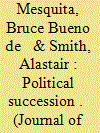

|
|
|
|
|
| Summary/Abstract |
In addition to everyday political threats, leaders risk removal from office through coups and mass movements such as rebellion. Further, all leaders face threats from shocks such as downturns in their health, their country’s economy, or their government’s revenue. By integrating these risks into the selectorate theory, we characterize the conditions under which each threat is pertinent and the countermoves (purges, democratization, expansion of public goods, and expansion of private benefits) that best enable the leader to survive in office. The model identifies new insights into the nature of assassins; the relative risk of different types of leader removal as a function of the extant institutions of government; and the endogenous factors driving better or worse public policy and decisions to democratize or become more autocratic. Importantly, the results highlight how an increase in the risk of deposition via one means intensifies other removal risks.
|
|
|
|
|
|
|
|
|
|
|
|
|
|
|
|
| 9 |
ID:
143792
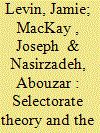

|
|
|
|
|
| Summary/Abstract |
UN peacekeeping has undergone two major shifts since the end of the cold war. The first is a move away from limited efforts to maintain peace in post-conflict environments towards more robust efforts at peace enforcement. Second, the composition of peacekeepers has changed. In 1990, the leading contributors of personnel to UN peacekeeping missions were notable supporters of multilateral cooperation and other liberal-democratic norms with extensive peacekeeping experience. As of 2012, however, the top contributors to UN peacekeeping missions had changed dramatically: Bangladesh, Pakistan, Ethiopia and Nigeria have replaced traditional peacekeepers Canada, Finland, Austria and Norway. While liberal-democratic nations continue to bear most of the costs, they have all but disappeared on the ground, leading to a precipitous decline in the quality of peacekeeping. The consequences of the latter shift are the subject of considerable debate. Some argue that peacekeeping facilitates the transmission of democratic norms and institutions to sending states. Others increasingly argue that the so-called ‘democratic peacekeeping’ hypothesis is a ‘myth’. We go further, suggesting that autocratic states may take on peacekeeping duties as a way of maintaining costly security apparatuses for the purposes of domestic repression. Peacekeeping – a feature of liberal post-cold war global governance – risks becoming a means to facilitate illiberal domestic governance in the developing world. We demonstrate this in two tentative but cautionary cases: Fiji and Bangladesh.
|
|
|
|
|
|
|
|
|
|
|
|
|
|
|
|
| 10 |
ID:
156632
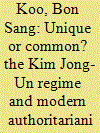

|
|
|
|
|
|
|
|